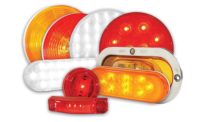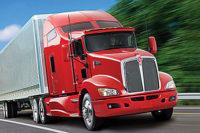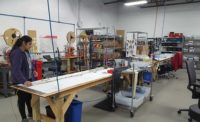With nearly a century of experience manufacturing trucks, it’s no surprise that Kenworth is one of PACCAR’s most successful arms. Kenworth, along with fellow PACCAR brand Peterbilt, achieved a record 30.7 percent of retail market share for Class 8 trucks in the U.S. and Canada in 2017, up from 28.5 percent in 2016. Looking to increase further, the Kirkland, WA, based company opened its 400th dealership in North America in February.
The success of Kenworth is also due to its innovation in design and manufacturing. This year, the company is field-testing the Kenworth T680 Zero-Emission Cargo Transport (ZECT) and the Kenworth Hybrid Electric Cargo Transport (HECT), two green trucks that could change the landscape of ground transportation. Additionally, Kenworth’s plants have received awards for their commitment to environmentally friendly practices.
Judy McTigue, Kenworth assistant general manager for operations, prides Kenworth on its ability to respond to customers’ needs in an efficient and cost-effective manner.
“It started with the first engineers who got their boots muddy by spending time with our primary customers in the logging fields,” she says. “Those engineers developed a keen understanding of customer requirements, as well as a respect for the conditions in which Kenworth vehicles would operate. This approach continues today. We spend a great deal of time with both current and future customers understanding what their pain points are and designing solutions to resolve them.”
ASSEMBLY: The market for heavy trucks seems to be booming now. How are Kenworth’s assembly plants doing?
McTigue: The Kenworth assembly plants in Renton, WA, and Chillicothe, OH, are both building trucks at a record pace with industry-leading quality. The market is very strong and the operations teams are focused on meeting the market demand and delivering the quality vehicles our customers expect. We are very proud of their efforts and pleased with the performance at all our plants.
ASSEMBLY: Kenworth’s Renton assembly plant was the first winner of our Assembly Plant of the Year Award back in 2004. How has the factory changed since then?
McTigue: We have a culture of continuous improvement with a focus on lean manufacturing in all of the PACCAR plants—the Kenworth-Renton plant is no exception to this. I think if you did a tour today, you would be pleased and surprised by all of the changes.
Some of the most notable changes involve the ability to build the complete range of Kenworth product offerings, including our largest vehicle, the 963, and our newest models, the T680 on-highway flagship and T880 vocational leader. There have been key investments in our manufacturing processes to make this happen, including a training area where we conduct PACCAR MX engine technician training for our North American dealer network.
ASSEMBLY: What assembly technologies have made the biggest impact on your operation during the past few years?
McTigue: There have been major technological advances that have improved efficiency, safety and quality at all the Kenworth plants. DC tools are a very good example of this, as they provide a quiet and precise operation, while also confirming and recording torque on critical joints, and improving ergonomics for the operator.
We’ve also invested in robotic operations in the cab build operations at our Kenworth-Chillicothe facility, and [we’ve invested in] automated guided vehicles in both the frame and axle trim areas at the PACCAR facility in Sainte-Therese, Quebec.
Companywide, we are investing in how to better leverage the tremendous amount of data that we collect in our factories through data analytics and visualization tools. There is a great deal of power in this technology to help continue to drive improvements on our three most important key performance indicators: safety, quality and efficiency.
ASSEMBLY: PACCAR is allocating $425 million to $475 million to capital expenditures this year. Will any of that be heading to Renton? What equipment or assembly technology is on your wish list?
McTigue: Yes, PACCAR pays close attention to balancing the investment portfolio. In the past five years, PACCAR has made $1.8 billion in capital investments worldwide.
The operations teams also look to learn from each other. As I mentioned earlier, we have a very interesting project in our PACCAR Sainte-Therese facility with AGVs. That plant was the first to utilize them a few years ago, and it continues to develop the utilization of that technology. Operations management across PACCAR is learning from that facility’s experiences and generating ideas for future AGV projects.
One of the key areas that Kenworth-Renton is exploring is how to better manage material flow inside the factory. We are looking to launch pick-to-voice and pick-to-light cells in the coming months.
ASSEMBLY: The Renton factory has received numerous awards for environmental stewardship. Has it been easy being green?
McTigue: Yes, primarily because this aligns well with PACCAR culture and is something that many of our employees care passionately about. We are very proud of our environmental record and the awards that the team has received.
This has been achieved through a focus on reducing our carbon footprint, significant improvements in reduction of energy use, as well as a continued focus on being a zero-waste-to-landfill facility.
ASSEMBLY: In recent months, Kenworth has rolled out multiple green and emissions-reducing models. Has making the trucks more environmentally friendly impacted assembly?
McTigue: There has not been a significant impact to our assembly operations. Our manufacturing processes are designed to be flexible and to adapt to changes in both chassis and cabs. It is exciting to take on new designs, and we are very happy to be able to offer these products to our customers.
ASSEMBLY: Many truck models now feature multimedia screens and technology to improve the drivers’ experience. How have these technologies changed the assembly process?
McTigue: The most important aspect of integrating new technologies into our vehicles, from the assembly point of view, is validating that all the functions are performing as designed. As a result, the testing protocols continue to increase in complexity.
We intentionally build redundancy into the test processes, and may check certain functions two, three or even four times throughout the assembly process. While we have always worked closely with our engineering teams and our suppliers, in the technology arena these relationships have become more hand-in-glove. We require multiple engineering validation, quality validation and volume validation builds, which are supported by both engineering and our partner suppliers.
ASSEMBLY: What does future hold for the factory? Will you be producing electric trucks or even self-driving trucks?
McTigue: In the context of the continued advancement of emissions and fuel economy regulations, as well as the potential performance benefits offered by advanced power trains, Kenworth and PACCAR are actively involved in ongoing research, development and field-testing of various technologies. While there is still of work to be done in advancing and validating these designs, Kenworth will be ready.
Many people may not know that Kenworth has been producing diesel-electric medium duty vehicles for several years. The current business environment for this technology is exciting and we look to leverage this experience going forward.
ASSEMBLY: You have risen to a high level on the manufacturing side. What do you think needs to be done to help women to achieve high levels of management positions in manufacturing—and to encourage women to enter into the manufacturing side of businesses?
McTigue: You have hit on one of the keys to helping improve the number of women who advance to high levels in manufacturing organizations, which is attracting more of us early on in our careers.
As plant manager at Kenworth-Chillicothe, I spent time working with community leaders, technical colleges and local school districts to raise awareness of the opportunities for women at our facility. Many young women think that these are still jobs that require the physical strength of a man to be successful. They are often surprised, when touring the plant, how that is no longer the case.
It is important to work in cooperation with technical colleges, but also with local high schools and middle schools to get the youth of America excited about the job opportunities in manufacturing. That holds both for shop floor positions, as well as the support functions of engineering, materials, accounting etc.
In terms of helping women to advance, I have benefited from receiving excellent guidance throughout my career from my peers, as well as managers. I encourage women to look for mentors, to seek out career advice and guidance from trusted advisors, and to grow their networks whenever possible.




